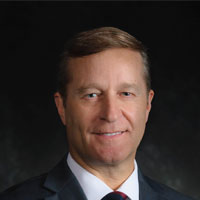December 14, 2020
Leadership Series: John F. Kennedy
Born in 1917, John Fitzgerald Kennedy was the youngest man ever elected to the presidency, succeeding the man who, at the time, was the oldest. He symbolized—as he well realized—a new generation and its coming-of-age. He was the first president born in the 20th century, the first young veteran of World War II to reach the White House.
The Kennedy family helped create his career and, later, his legacy. He could never have reached the presidency without his father’s help. Joseph Kennedy, one of the wealthiest and most ruthless men in America, had counted on his first son, Joe Jr., to enter politics. When Joe died in the war, his father’s ambitions turned to the next-oldest son. He paid for all of John’s—Jack’s—campaigns and used his millions to bring in supporters. He prevailed on his friend Arthur Krock, of The New York Times, to help Jack publish his first book, Why England Slept. Years later, when Kennedy wrote Profiles in Courage with the help of his aide Theodore Sorensen, Krock lobbied successfully for the book to win a Pulitzer Prize.
President Kennedy spent less than three years in the White House. His first year was a disaster, as he himself acknowledged. The Bay of Pigs invasion of Communist Cuba was only the first in a series of failed efforts to undo Fidel Castro’s regime. His 1961 summit meeting in Vienna with the Soviet leader Nikita Khrushchev was a humiliating experience. Most of his legislative proposals died on Capitol Hill.
Yet he was also responsible for some extraordinary accomplishments. The most important, and most famous, was his adept management of the Cuban missile crisis in 1962, widely considered the most perilous moment since World War II. Most of his military advisers—and they were not alone—believed the United States should bomb the missile pads that the Soviet Union was stationing in Cuba. Kennedy, aware of the danger of escalating the crisis, instead ordered a blockade of Soviet ships. In the end, a peaceful agreement was reached.
Kennedy, during his short presidency, proposed many important steps forward. In an address at American University in 1963, he spoke kindly of the Soviet Union, thereby easing the Cold War. The following day, after almost two years of mostly avoiding the issue of civil rights, he delivered a speech of exceptional elegance, and launched a drive for a civil-rights bill that he hoped would end racial segregation. He also proposed a voting-rights bill and federal programs to provide health care to the elderly and the poor. Few of these proposals became law in his lifetime—a great disappointment to Kennedy, who was never very successful with Congress. But most of these bills became law after his death—in part because of his successor’s political skill, but also because they seemed like a monument to a martyred president.
There are several other leadership styles that may be used to describe Kennedy such as Transformational and behavioral, but the most representative is that of a servant leader. The ten major characteristics of servant leadership which are listening, empathy, healing relationships, awareness, persuasion, conceptualization, foresight, stewardship, commitment to the growth of people, and commitment to building a community.
Servant leaders serve their group by working on their behalf to help them achieve their goals. An example of Kennedy as a servant leader is where he took vigorous action in the cause of equal rights – he called for new civil rights legislation. Kennedy created an environment of comfort for Americans. His vision extended the quality of the national culture and the central role of the arts in a vital society, bringing America into a new era.
You cannot write about John F. Kennedy without mentioning his famous words, “ask not what your country can do for you, ask what you can do for your country.” This historical statement emphasizes the “building community” characteristic that is one of the 10 characteristics of servant leadership. The community in this case is our fellow citizens who all share in the same interest of the greater good for our country. As a servant leader, Kennedy wanted to build community, the country, and provide a place where everyone would feel safe and connected. He had a strong commitment to his followers. Transformational and behavioral styles also take consideration of the follower into the leadership theory but John F. Kennedy was a true Servant Leader.
Half a century after his presidency, the endurance of Kennedy’s appeal is not simply the result of a crafted image and personal charm. It also reflects the historical moment in which he emerged. In the early 1960s, much of the American public was willing, even eager, to believe that he was the man who would “get the country moving again,” at a time when much of the country was ready to move. Action and dynamism were central to Kennedy’s appeal.
Kennedy helped give urgency to the idea of pursuing a national purpose—a great American mission. In the 15 years since World War II, ideological momentum had been slowly building in the United States, fueled by anxieties about the rivalry with the Soviet Union and by optimism about the dynamic performance of the American economy.
When Kennedy won the presidency, the desire for change was still tentative, as his agonizingly thin margin over Richard Nixon suggests. But it was growing, and Kennedy seized the moment to provide a mission—or at least he grasped the need for one—even though it was not entirely clear what the mission was. Early in his tenure, a Defense Department official wrote a policy paper that expressed a curious mix of urgent purpose and vague goals:
The United States needs a Grand Objective … We behave as if our real objective is to sit by our pools contemplating the spare tires around our middles … The key consideration is not that the Grand Objective be exactly right, it is that we have one and that we start moving toward it. This reflected John Kennedy’s worldview, one of commitment, action, movement.
John F Kennedy was a good president, on this most scholars concur. A poll of historians in 1982 ranked him 13th out of the 36 presidents included in the survey. Thirteen such polls from 1982 to 2011 put him, on average, 12th. He was assassinated in November of 1963 in Dallas Texas.



